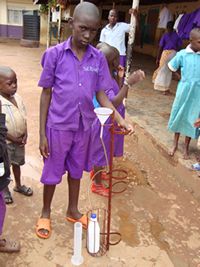 |
|
Installation of Weather Station at Outspan Primary School | Pupils at Outspan Primary School in Bwaise, a poor, flood-prone neighbourhood in Kampala, Uganda, are learning how to collect meteorological data – and, along the way, something about how climate change increasingly will affect their lives. Two times a day they measure the amount of rain that has fallen over the past several hours at their school grounds. They then jot down observations on the duration of the rainfall and its effect in terms of flooding of their school yard.
The school's head teacher, Mr. Leonard Okokes, is pleased about the pedagogic benefits of the activity. "The collection of rainfall data is important for our education programme. Classes are studying weather changes on a daily basis, and this provides practical lessons to our pupils". At the same time this hands-on activity is not merely a classroom learning exercise, but rather forms part of a much broader, real world assessment.
This innovative learning approach is being tested as part of the data collection component of the UN-Habitat-supported Kampala Integrated Flood Management project. The Kampala Capital City Authority (KCCA) recently joined forces with UN-Habitat's Cities and Climate Change Initiative (CCCI) to gauge that city's flood risk; this assessment is a first step in helping KCCA to develop a strategy to manage the city's urgent flooding problem. A diverse team led by the Faculty of Geo-Information Science and Earth Observation at the University of Twente (ITC) in the Netherlands, along with faculty members of Kampala's Makerere University and a German engineer who specialises in urban hydrology, is implementing the study.
Flooding is an urgent environmental concern in Kampala. Much of the city is built on former wetlands and swampy ground. A high proportion of the urban poor live in these flood-prone areas. In recent years unplanned urbanisation, poor management of solid waste which can clog storm sewers, as well as other factors, have increased residents' exposure to flooding and ancillary hazards. These secondary hazards include health issues: over the past 15 years, Kampala has suffered from several disease outbreaks that are at least partly attributable to increased flooding, and which especially afflict the most vulnerable.
Along with negative effects on health, flooding also interrupts people's everyday lives. In the case of pupils and teachers at Outspan Primary School, three heavy rainfall events between April and May 2012 flooded classrooms and left the school grounds temporarily inaccessible. Poverty and a lack of resources underlie the flooding issue. In the future, without a long-term strategy, increased urbanisation coupled with climate change may well lead to deteriorating conditions.
If you want to read the entire article click here |